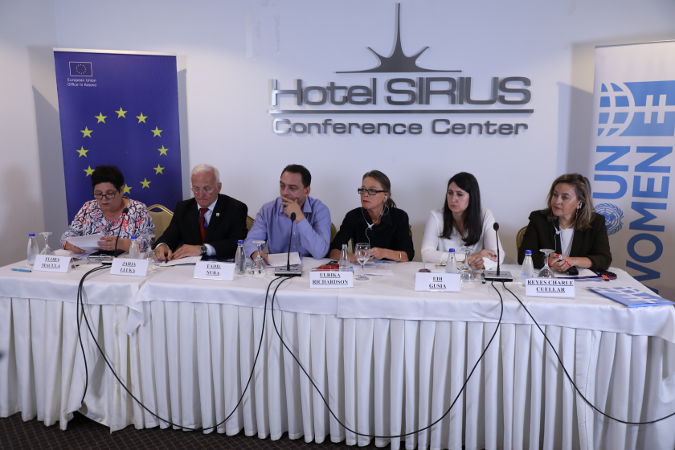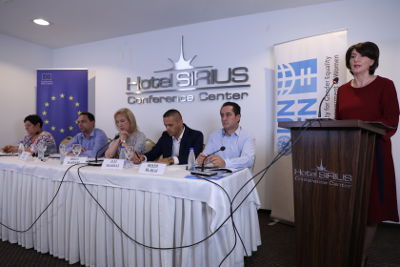Providing justice for war-time sexual violence survivors remains a challenge in Kosovo
Date:

To commemorate the International Day for the Elimination of Sexual Violence in Conflict, UN Women Office in Kosovo[1] organized the conference “Providing justice for conflict- related sexual violence survivors: Challenges and the way forward”.
The conference brought together key local and international stakeholders to provide a better understanding of the complexity surrounding conflict-related sexual violence, its impacts, and obstacles in providing justice for survivors, exchanging insights and expertise related to the specificities of Kosovo.
In her opening remarks, Flora Macula, UN Women Head of Office, noted that until recently the issue of survivors of sexual violence during the conflict and their access to rights and reparations in Kosovo was a matter neglected by the institutions. She emphasized the need for more commitment from the government to acknowledge this crime and bring people to justice.
“The government of Kosovo is committed to recognizing the truth and willing to support the commission dealing with conflict-related sexual violence survivors. We have to work together as a society to ease the suffering of the survivors,” stated Jahja Lluka, Political Adviser to the Prime Minister of Kosovo.
Deputy Minister of Justice, Faruk Nura, emphasized the need to bring perpetrators to justice and said, “More needs to be done to reintegrate survivors into society and support them in access to the courts.”
Ulrika Richardson, UN Development Coordinator and UNDP Resident Representative in Kosovo emphasized the need to end impunity as an essential ingredient for social justice and sustainable peace.
“We must encourage families to speak up and speak out on their loss” said Edi Gusia, Chief Executive of the Agency for Gender Equality.
Reyes Charle Cuellar, Legal Adviser to the EU Special Representative, focused particularly on two main things that are needed to tackle sexual violence: “A conducive environment and a change of mindset”.
During the panel discussions, the participants identified practical steps to advance the implementation of national laws, policies and action plans that aim to meet the needs of survivors of conflict-related sexual violence regarding their access to justice.

“We have to work with the entire society to close once and forever the thinking of sexual violence as something to be ashamed of – it is a crime that needs to be punished,” said Atifete Jahjaga – the former President of Kosovo and founder of Jahjaga Foundation.
“The issue of bringing justice to the survivors is not only an issue of the prosecution body but of the entire society,” said Drita Hajdari, War Crimes Prosecutor at the Special Prosecution Office of Kosovo. “The war crimes shall not be an issue only for Kosovo but should be regarded as an important issue by all countrie,” she added.
Avni Vrajolli from the War Crimes Unit at Kosovo Police reassured that the Kosovo Police is qualified to treat and serve conflict-related sexual violence cases as war crimes.
Bekim Blakaj, Executive Director of the Humanitarian Law Center in Kosovo, emphasized the need for more data and facts from institutions and regional commissions.
This conference is organized as part of the UN Women project “Gender Sensitive Transitional Justice”, with the financial support of the European Union, to increase the effectiveness of transitional justice processes to contribute to a more just and stable society.
UN Women remains a committed partner in the provision of expertise technical assistance, and support to the Ministry of Justice, Special Prosecution Office of Kosovo and Kosovo Police to facilitate access to justice for conflict-related sexual violence survivors and end impunity in Kosovo.
[1] All references to Kosovo on this website shall be understood to be in full compliance with UN Security Council Resolution 1244 (1999).